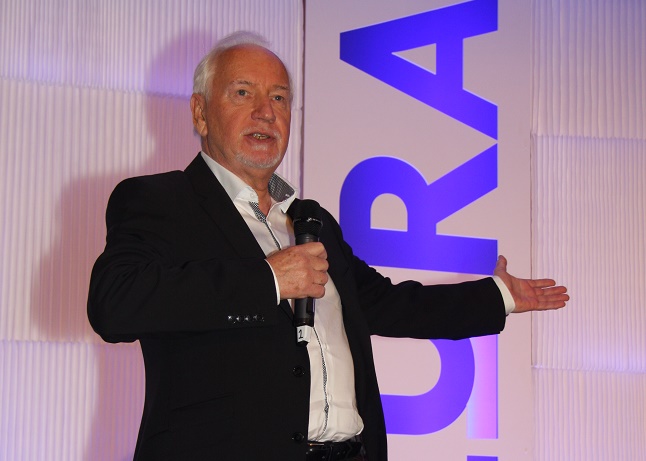Ray Hammond predicts the future at the EuRA conference in April in his ‘Key drivers for the future’ speech. By Sophie Neal.

Ray Hammond is a ‘futureologist’. “Is this a ridiculous job title, how can someone have an ‘ology’ in the future?” he asked. After he posed the question to the audience, who laughed a little nervously (they were wondering exactly that) he made a few points to set the stage for his speech on the ‘key drivers of the future’.
By studying the big trends of the present, Ray Hammond predicts the trends of the future – the world today is his crystal ball, as it were. He emphasised that language fails to describe the technological future. Although Shakespeare and Dante’s words resonate as much today as they did 400 years ago, they only write about the human condition, universal experiences of love, life, lust, which do not change from one generation to another.
“Our lives are shaped by technology. It is arriving at such a pace and we cannot describe it.” The audience became very still. Suddenly, this futureology business began to make a bit of sense.
Words fail to describe the ‘potential of technology’. A projector was a ‘magic lantern’, a car a ‘horseless carriage’ and society couldn’t describe a locomotive as anything other than an ‘iron horse’ as they could only understand it in this way.
Ray mentioned the smartphone, something we know all too well, dominating our daily lives and keeping us connected to everyone and everything, wherever we are. “[The word smartphone] is as useful in describing what potential is there as the phrase ‘horseless carriage’ was,” he said. These initial points illustrated how technology is moving faster than language can keep up. This led Ray to his eight key drivers that will shape the world in the next thirty years and beyond, some of crucial importance to those in this industry.
The first key driver asked how we will find the food, fuel and water for an expending population. The 7.2 billion people on the planet will increase to 8.2 billion by 2050 and by 2050, research suggests there will be 9 billion people. This predicted 50% increase means we have to be more careful, explained Ray.
The growing population led Ray to the second driver, a rapidly ageing demographic in developed countries. Britain has gone from an ageing society to one of the ’most scintillating and growing countries’ in the world. Finland has since overtaken Japan as the most ageing society so it must be of concern to everyone that the countries they operate in are ageing differently.
Ray highlighted his third driver as one of the most important, but hastily added that he wouldn’t dwell on it. “Climate change has not gone away. It has continued inexorably.” Other headlines may have pushed the issue of climate change under the door mat, but Ray Hammond urged the audience to not forget this important issue.
The first three drivers resulted in the fourth, an ongoing, global energy crisis. “This is the perfect storm. We must find more energy in the next fifty years.”
“The next driver is responsible for the vibrancy of this meeting,” said Ray, “You all have a role … you are the facilitators of Globalisation.” He presented the audience with an interesting note to bear in mind; globalisation has done more to reduce global poverty than foreign aid from developed countries since the Second World War. As the audience chewed on this information, it is obvious to many that globalisation is crucial to growth. Companies setting up in less developed countries mean jobs and careers. If globalisation is carried out ethically and responsibly, “it is the greatest force of good on the planet.”
The multiple revolutions in medical science will have a huge impact on humanity and our longevity. “Medicine is moving at the speed of light … we are going to live a lot longer than we think,” explained Ray, “Perhaps when I’m 90, I’ll look 30!”
The penultimate point Ray made was about the acceleration of technology. In 2030, we might all have an implant behind our ear. A Maria, a John or Debora, the answer to information overload and consistent connectivity. “Maria is my personal assistant … she is what my smartphone has become.” This is why ‘smartphone’ does not portray the potential of the technology we take for granted.
The final driver was handed out with a warning. “The bottom two billion people on the social ladder will be the poorest in the world.” Ray sincerely told the audience that if you exclude the boy from the village, he will come back a man and burn the village down. “If governments do not invite these people in, they will come and get us.”
He wrapped up the speech by noting how the digital world has led to a new phase in global economy. Ray Hammond’s engaging talk left room for thought on our ever changing world and he looks forward to a future where cultures can mesh and grow together.
Photo: Ray Hammond at the EuRA conference.
Click here to see the next Editor's Pick